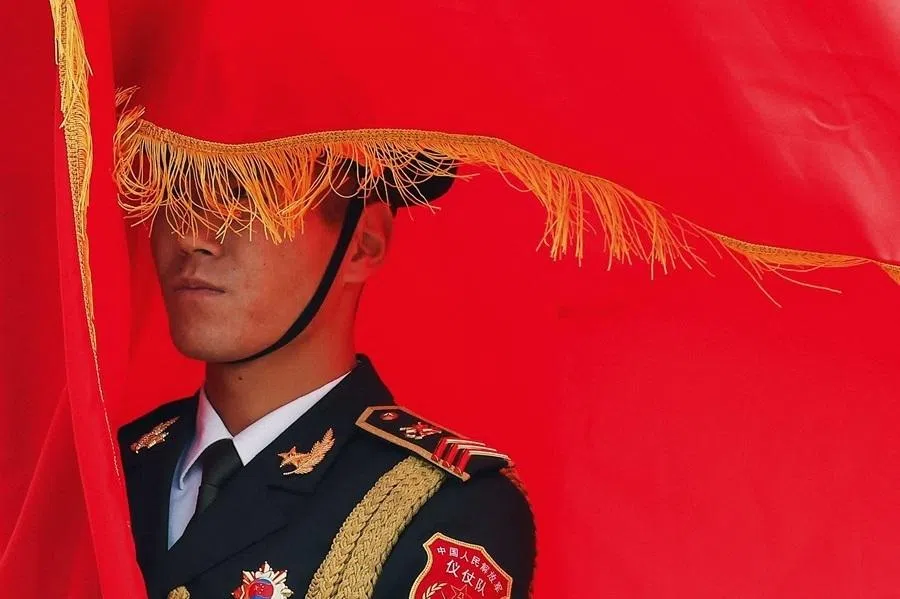George Yeo: Cross-strait relations from a Singaporean's viewpoint
Singapore's former Foreign Minister George Yeo gave a keynote speech at the Asia-Pacific Forward Forum in Taipei, where he spoke on cross-strait relations, the "one China" policy, and the future of mainland China and Taiwan, as well as his personal experiences interacting with individuals from both sides of the Taiwan Strait.
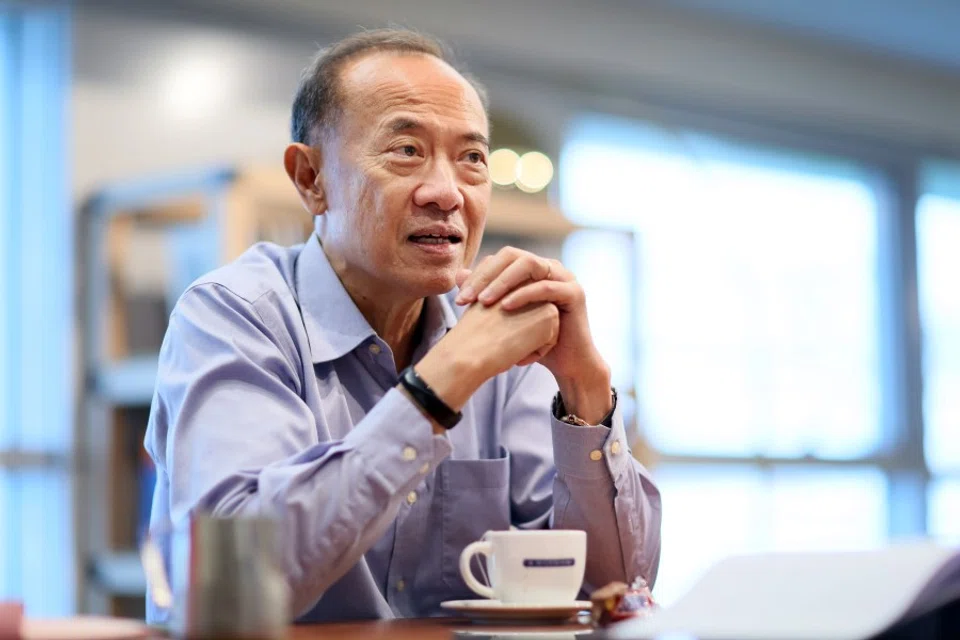
A few months ago, my taiji grandmaster sent a message reminding all his disciples that the third day of the third lunar month is the birthday of the patron deity of taiji, Zhenwu Dadi (真武大帝), sometimes called Xuandi (玄帝). On that day, we should all pray to him. Being a Catholic, I do not worship him as a deity but I am happy to honour him as a remarkable historical figure who lived a long time ago in the Wudang Mountains.
I belong to the Nam Hwa Taiji School. My taiji grandmaster Sim Pooh Ho is a Singaporean who now lives in Kunming. He has thousands of disciples all over the world. Many are Taiwanese. In Taiwan, our most senior taiji master is Dr Yeh Ming-hsien, who is a physician working in Tzu Chi Foundation.
In March 2015, Master Sim gathered many of his disciples in Yilan to practise taiji as a group. We stayed at the compound of the Sanching Temple, which is the most important Taoist temple in Taiwan. I remember it has a big outdoor statue of the philosopher Laozi. There was an important festival that day. As the Sanching Temple is the head temple for all Taoist temples in Taiwan, temples from all over Taiwan sent delegations to worship bringing their deities along. All day long, we heard the beating of drums, the clashing of gongs and the explosion of fire crackers.
Tenacity of Chinese civilisation
Chinese civilisation is bound together not just by history and by big philosophical ideas like Taoism and Confucianism, but also in the everyday beliefs of Chinese communities, not just on both sides of the Taiwan Strait but throughout the world. All over Southeast Asia, there are temples of Mazu (妈祖) and Dabogong (大伯公) like those in Fujian, Guangdong, Hainan and Taiwan. We celebrate the same festivals like Chinese New Year (春节), the Seventh Lunar Month (中元节) and Mid-Autumn Festival (中秋节). Food is also a very important part of Chinese culture. After travelling three or four days overseas, most Chinese people I know yearn for rice and noodles.
However, even when China is disunited and Chinese people are scattered overseas in diaspora communities, the ideal of a universal Chinese family is deeply ingrained even though they have their internal divisions.

In Chinese culture, there is always tension between loyalty to family and clan, and loyalty to the country. The idea of a country-family is often held up as an ideal but, in practice, as Dr Sun Yat-sen reminded us, the Chinese people can be a tray of loose sand. However, even when China is disunited and Chinese people are scattered overseas in diaspora communities, the ideal of a universal Chinese family is deeply ingrained even though they have their internal divisions. From my own subjective impressions, other "chopsticks people" like the Koreans and the Japanese are not as rooted in their identity after one or two generations overseas, as the Chinese are. The Vietnamese are somewhere in between, perhaps reflecting its long years under Chinese rule.
In Southeast Asia, the self-identity of overseas Chinese communities have created political difficulties in different ways and to varying degrees. The People's Republic of China (PRC) saw that the split loyalties of local Chinese communities complicated its foreign policy and encouraged overseas Chinese to adopt local citizenships and be loyal to the countries of their citizenship. Premier Zhou Enlai spelt this out clearly during the Bandung Conference in 1955. However, the strong links between the Communist Party of China (CPC) and local communist parties in Thailand, Myanmar, Philippines, Indonesia, Malaya and Singapore, many of which had a high proportion of ethnic Chinese members, for a long time remained a source of suspicion that the PRC was interfering in their domestic affairs. Throughout the Suharto years, Indonesia banned the Chinese language and many Chinese Indonesians were forced to adopt Indonesian names.
The Republic of China (ROC) felt a stronger sense of responsibility for overseas Chinese. Overseas Chinese in Southeast Asia could easily claim citizenship in Taiwan. Scholarships to study in Taiwan were liberally given to overseas Chinese from Hong Kong, Southeast Asia and elsewhere.
Taiwan, an old friend of Singapore
Singapore is three-quarters ethnic Chinese. It is a multiracial society. Our national language is Malay, our common language is English, but many Chinese Singaporeans speak Mandarin and southern Chinese dialects. For the first few years of my life, I only spoke Teochew, which was the only language I spoke to my mother throughout her life. She was born in China and only came to Singapore after she married my father in Chao'an at the age of 19. Our political loyalty, however, is to Singapore.
Once, when PRC leaders described Lee Kuan Yew as an old friend, he remarked to Singapore grassroots leaders that Taiwan was an older friend.
Many Chinese Singaporeans see mainland China and Taiwan as belonging to one Chinese nation, and feel a sense of kinship to both sides. I have often said that Singapore is not part of the Chinese family but a relative. When our young soldiers train in Taiwan, they feel this kinship strongly. Even non-Chinese Singaporeans training in Taiwan can sense it even though they may have difficulty communicating with local Taiwanese.
It was this sense of kinship which engendered a strong bond of friendship between Chiang Ching-kuo and Lee Kuan Yew. Chiang Ching-kuo was 13 years older than Lee Kuan Yew and wanted a newly independent, majority-Chinese Singapore to succeed. Allowing Singapore soldiers to train in large numbers in Taiwan all over the island, wearing ROC Army uniform without insignia, was extraordinary. Singaporeans will never forget Taiwan's assistance to Singapore at a very vulnerable period of our early history.
Once, when PRC leaders described Lee Kuan Yew as an old friend, he remarked to Singapore grassroots leaders that Taiwan was an older friend. However, Lee Kuan Yew took care to inform Chiang Ching-kuo very early that once diplomatic relations were established between Singapore and the PRC, the flag and the crest of the ROC in Singapore would have to be taken down. There was therefore no issue when the change took place in 1990.
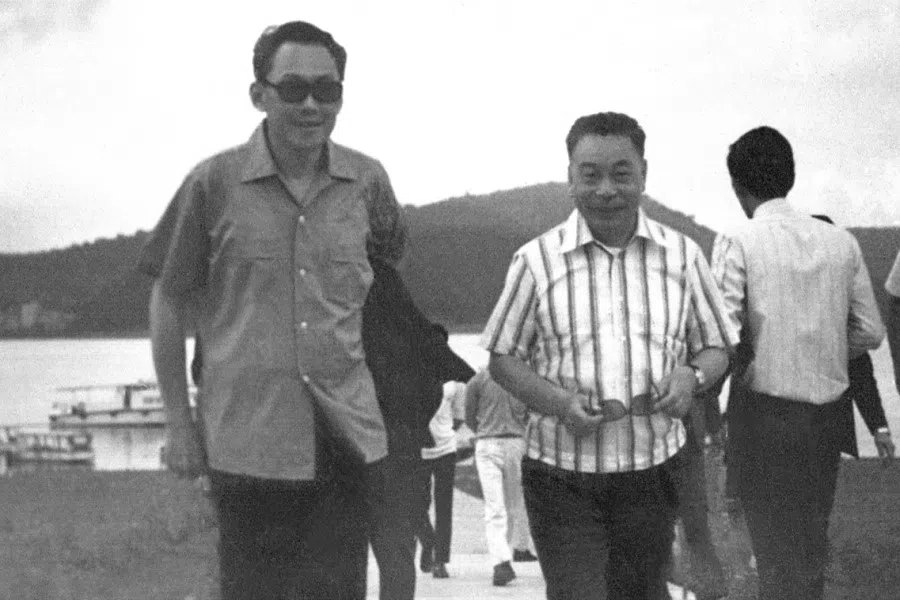
Taiwan also sent military officers to help train Singapore's Air Force and Navy personnel in the early years of our independence. When I was posted from the Army to the Air Force in 1980, my immediate superior was a Taiwanese Air Force officer, Fu Chun-hsien. Although he held a higher rank in the ROC Air Force, he took a lower rank in the Singapore Air Force in order to blend in. This was the case for a number of senior ROC Air Force and Navy officers who helped us in our early days.
Fu was a gentleman, born in Shandong, and was reputedly the first ROC pilot to shoot down a PRC MiG with a Sidewinder missile. One day, he told me he was applying for a permit to visit Shandong with his Singapore passport and hoped that the PRC Representative Office in Singapore, which was their de facto embassy before we had diplomatic relations, would not know of his background. Not a chance. They knew his background in detail and offered to facilitate his visit, even to arrange a local welcome when he arrived in his hometown. He declined the offer politely, preferring a quiet, private return to his hometown. He had a good experience and visited Shandong regularly after that. He died a few years ago in Los Angeles.
Links with mainland China and Taiwan
My mother and my paternal grandfather came from the Chaoshan region of China. My paternal grandfather became wealthy as a rubber planter in Johor in southern Peninsular Malaysia. With the money, he bought land in Anbu, Chao'an, and became a rich farmer of some standing in the village. When he died in 1937, my father who was born in Johor, went back for the funeral. He was 21 years old. Under local custom, he could marry within a hundred days or mourn for three years. My mother, who was also from Chao'an, became his bride.
A month later, the Marco Polo Bridge incident happened which began Japan's invasion of China proper. They rushed back to the Nanyang and could not visit Chao'an for many years, until 1978, when Deng Xiaoping started his policy to reform and open up mainland China.
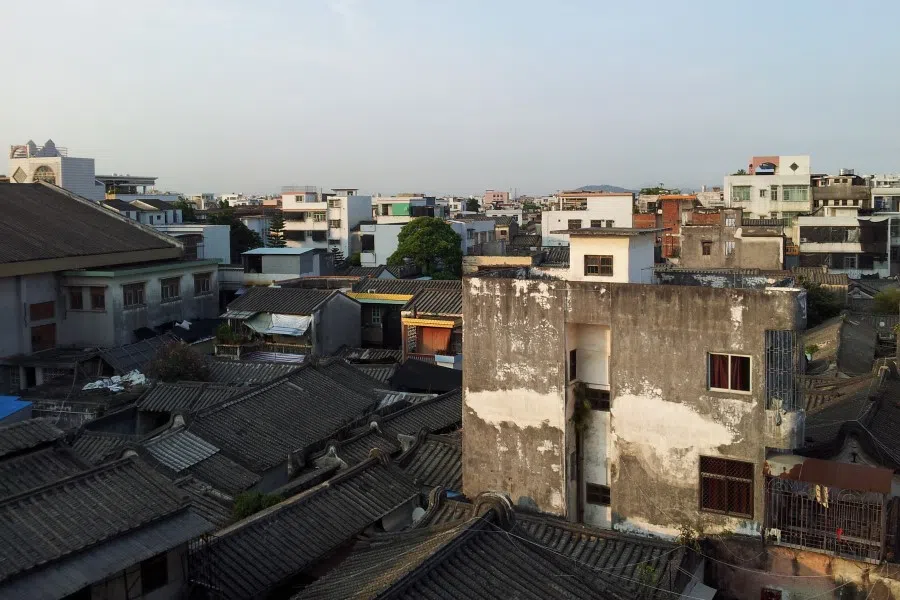
I first visited mainland China with my parents in 1983. My maternal grandparents were then in their 90s. Since then, I have brought my wife and four children to visit our ancestral village and honour our ancestors many times. On one occasion, we took a boat to Nan'ao Island and learned that after an earthquake in 1918, many Chaozhou people from there emigrated to Taiwan where there was already an indigenous Chaozhou community centred on Chaozhou town in Pingtung.
The period of martial law in Taiwan was repressive and perhaps necessary given the historical and economic situation but it also gave birth to the DPP.
My first visit to Taiwan was in 1976 when I was 22 years old. After graduating from Cambridge in England, I went over to Augusta, Georgia to be trained by the US Army as a signals officer. I was then posted to the US Army 25th Infantry Division in Honolulu for two weeks of exposure. While in Honolulu, I went to the ROC consulate to apply for a visa to visit Taiwan. At that time, the Singapore passport I carried did not allow us to visit mainland China or Taiwan without special permission. The ROC consulate was very understanding and issued the visa on a separate piece of paper.
On arrival at Taipei airport, I had an unpleasant encounter with a customs official. Noticing that an old alarm clock box which I used to keep small items had "Made in PRC" on it, he threw it away summarily. In my same suitcase were the collected works of Mao Zedong in English with the covers torn off. Luckily he did not see the books or I would have been subject to interrogation or worse.
In Taipei, I met my cousin who had married a Taiwanese gentleman whose family I heard was connected to senior people in the KMT. At a dinner, a waitress tripped and spilt some tea or soup on a guest. After she had sheepishly apologised and retreated, the person sitting next to him said that he should have slapped her, gesticulating with his hand. I was stunned and never forgot the incident. It could well have been an isolated incident and I should not generalise. When I learned about the 228 incident later, however, my mind went back to that first visit to Taiwan in 1977.
The period of martial law in Taiwan was repressive and perhaps necessary given the historical and economic situation but it also gave birth to the DPP. Lee Kuan Yew's Singapore was also considered repressive by a number of Western commentators. Till today, the circumstances surrounding the 228 Incident are disputed in Taiwan. In an attempt at reconciliation, 28 February was made a Peace Memorial Day and a public holiday in 1997, ten years after martial law was lifted. But, like a number of events in mainland China, it will take time for wounds to heal.
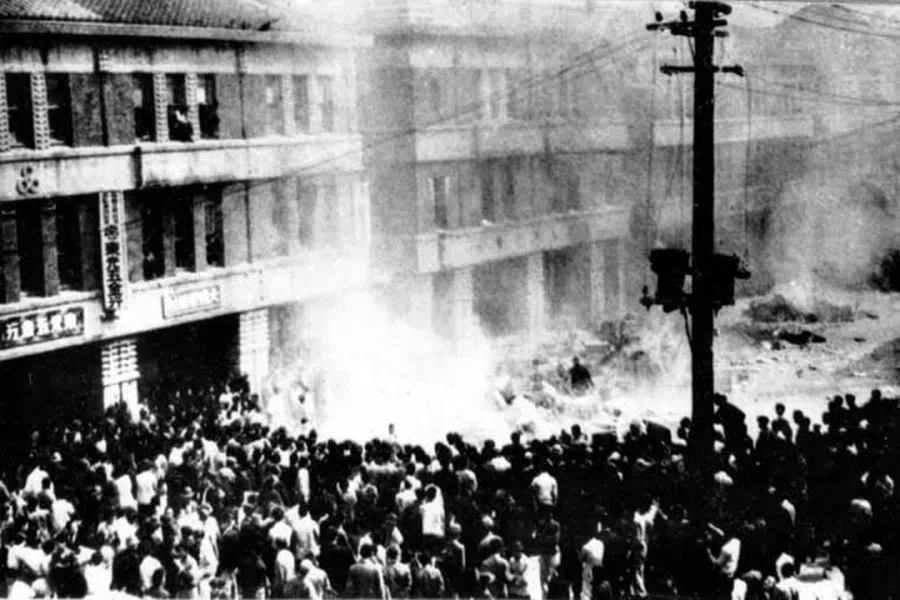
Taiwan was significantly poorer than Singapore in the 1970s. When I first did military training in Taiwan in 1977 in Hengchun, our soldier boys bought all manner of cheap Taiwan products including blankets and other souvenirs. In those years, the Taiwanese economy made rapid strides and, within a short time, Taiwanese products became no longer cheap for them. I visited Taiwan as a colonel in the mid-1980s and made calls on senior ROC generals. I learned that the quality of the Kinmen Kaoliang served at dinner depended on the rank of my host. Those served by four-star generals gave me no hangover.
On Singapore's Taiwan relationship, we understood that Deng Xiaoping intervened to make Singapore an exception.
Singapore-Taiwan relations
Thus, when I became a minister in the Singapore government, I already had a certain familiarity with Taiwan and an affection for the island and its people. We were partly influenced by Lee Kuan Yew who must have visited Taiwan every year. After meeting Chiang Ching-kuo in Taipei, Vice President Lee Teng Hui would escort Lee Kuan Yew to different parts of Taiwan. Lee Kuan Yew knew that Chiang Ching-kuo was planning to abolish martial law and introduce democratic elections. I remember Lee Kuan Yew telling us that, regardless of whether we had diplomatic relations with Beijing, he would have to attend Chiang Ching-kuo's funeral when the time came.
When Singapore and China began negotiations to establish diplomatic relations around 1989, our unique relationship with Taiwan was a sticking point. During Lee Kuan Yew's visit to Beijing in May 1976, Hua Guofeng suggested that the Singapore Armed Forces train on Hainan Island instead. That was unthinkable. Singapore's position at the time was that we would not establish diplomatic relations with China until Indonesia had normalised its relations with China. China understood Singapore's defence needs and diplomatic relations with China were established in 1990. On Singapore's Taiwan relationship, we understood that Deng Xiaoping intervened to make Singapore an exception.
APEC was launched in Canberra in 1989 without the inclusion of mainland China, Hong Kong and Taiwan. The so-called "Three Chinas" issue was much discussed both in Canberra and in the subsequent meeting in Singapore in 1990. In the Seoul meeting in 1991, an agreement was struck whereby APEC would be a meeting of economies with no flag or crest displayed at meetings. Like all other members, mainland China was represented by both foreign and trade ministers, while HK and Taiwan would only be represented by trade or economic ministers.
I remember vividly the 1992 meeting in Bangkok when mainland China was represented by Li Lanqing, Hong Kong by Brian Chau and Taiwan by Vincent Siew. At an informal lunch, without any pre-arrangement, Li Lanqing, Brian Chau, Vincent Siew and I collected our food from the buffet table and sat down together. I felt like a relative joining a family meal. I can't remember what the conversation was about but I can never forget the significance and emotion of that little gathering. In that year, between mainland China and Taiwan, a "one China" consensus was reached. That paved the way for the Koo-Wang Talks in Singapore, the thirtieth anniversary of which we celebrate this year.
When I was minister for information and the arts, the old villa called Wanqingyuan (晚晴园) which Dr Sun Yat-sen stayed many times, was declared a national monument in 1994. It was in that villa that the ROC flag was first sewn by the wife of the owner of the villa, Teo Eng Hock, the great grand uncle of Singapore's Senior Minister Teo Chee Hean. It was in that villa that the Tongmenghui Nanyang branch was established by Dr Sun in 1906 and I am proud to say that my wife's great-grandfather, Ho Sum Tim, was one of its founders. Ho Sum Tin received two medals from Dr Sun which are now in my possession. I once showed them to KMT chairman Ma Ying-jeou when he came to my home for dinner.
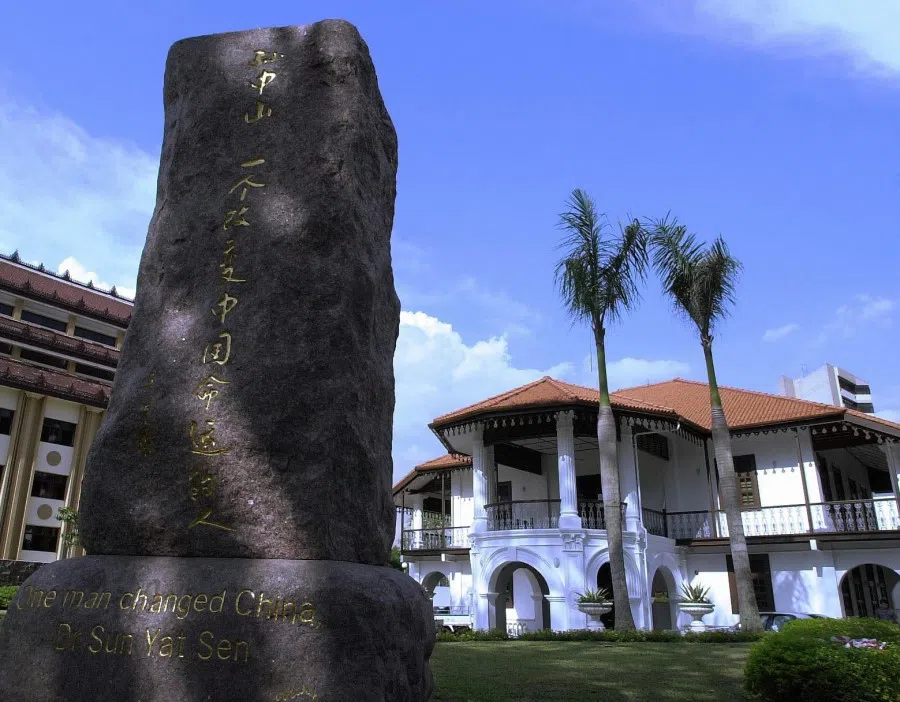
The Sun Yat Sen Nanyang Memorial Hall was opened by Lee Kuan Yew at Wanqingyuan in 2001. On Dr Sun, Lee Kuan Yew wrote: "One man changed China." In the garden, there is a large boulder cleft in two, each half facing the other in the garden. Etched on one is the calligraphy by Koo Chen-foo. He wrote "仁心果" which is Chinese for the chiku fruit. It was one of the fruits Dr Sun liked to eat in the Nanyang. The fruit was chosen because the flesh is reddish-brown like the colour of the human heart. On the other is the calligraphy by Wang Daohan with the words "烈士树" or martyr tree.
The Koo-Wang meetings were held in the old NOL Building. A framed picture of the NOL Building published by Lianhe Zaobao carried the names of the people on both sides of the Taiwan Strait who took part in the talks. As a Singaporean, I was proud that Singaporeans played a significant role in the 1911 Revolution which transformed the lives of Chinese all over the world, in the anti-Japanese War, for which Singaporeans paid a heavy price when the Japanese Imperial Army conquered Singapore in 1942, and in the efforts by both sides to establish peaceful reunification.
President Lee suggested that the Taiwanese were of a different race from mainland Chinese. When Lee Kuan Yew learned of the interview, he was very troubled.
Taiwan's changing sentiments
In 1994, Lee Teng-hui gave an interview to Japanese writer Shiba Ryotaro, describing himself as Moses taking his people out of Egypt. In that interview, he described the anguish of the Taiwanese. President Lee suggested that the Taiwanese were of a different race from mainland Chinese. When Lee Kuan Yew learned of the interview, he was very troubled. I accompanied Lee Kuan Yew on his visit to Taiwan not long afterwards. The meeting was held outside Taipei in Ta Shee Golf and Country Club. Lee Kuan Yew was guarded when he spoke to Lee Teng-hui. He felt a certain foreboding.
KMT old guards like General Hau Pei-tsun were upset with President Lee's interview. I played golf with General Hau probably during that visit. General Hau's shots were short but accurate. He insisted on playing despite the rain. Hearing thunder and seeing lightning, I felt uncomfortable. But General Hau was unflappable saying that it reminded him of wartime. For men like him, Taiwan and mainland China were parts of "one China" and saying otherwise was outrageous.
In 1995, Lee Teng-hui visited Cornell University, his alma mater. This led to the Taiwan Strait crisis of 1996. In 1999, I visited Taiwan as trade minister and called on Lee Teng-hui. In the course of the conversation, I expressed my misgivings about Japanese ministers visiting Yasukuni Shrine. President Lee said there was nothing wrong as they were only remembering their war dead. I did not know then that President Lee's own brother was an Imperial Army officer who was remembered in that shrine. President Lee gave me an English version of his book on Taiwan's Road to Democracy which I read after he had left office in order to gain a deeper understanding of his thinking and underlying motivations. In his book, he was careful to acknowledge his own Chinese-ness.
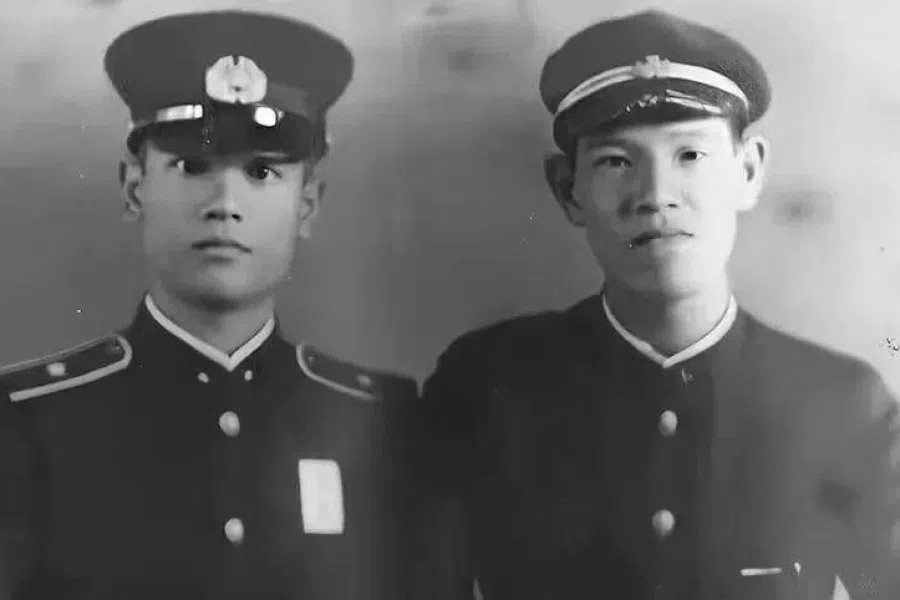
But Taiwan society was changing. A younger generation, with less knowledge and feeling for the history of the ROC, had different aspirations. In January 2000, I watched the dramatic moments when Chen Shui-bian was elected President at Taipei Representative Ouyang Jui-hsiung's apartment. Without Ma Ying-jeou's persuasive leadership that night, the angry pro-KMT crowd outside the Presidential Palace would not have dispersed peacefully. Elsewhere, however, the majority of young Taiwanese celebrated.
Although Singapore has a clear "one China" policy, the Singapore government never takes sides in Taiwan's domestic politics. When I was trade minister, I held annual meetings with my Taiwanese counterpart. Both mainland China and Taiwan were in the final stages of acceding to the WTO. Under WTO rules, separate customs territories could negotiate free trade agreements. I saw this as a way to help Taiwan. At the APEC Trade Ministers' Meeting in Shanghai in June 2001, I proposed to Taiwan's Minister for Economic Affairs Lin Hsin-i that Singapore and Taiwan launch free trade negotiations in Shanghai, in mainland China itself.
Taiwan's president then was Chen Shiu-bian. I drafted a few sentences making the initiative completely apolitical. Minister Lin was enthusiastic and thankful but said he had to refer to Taipei. A day or two later, he returned with a counter-proposal which consisted of one or two pages. Taipei had decided to politicise Singapore's proposal which was a non-starter for me. That year, Taipei decided not to be represented at the APEC Economic Leaders' Meeting in Shanghai. When Minister Lin and I met again the following year in Singapore, after Taiwan had acceded to the WTO, I tried again to launch negotiations in a low-key manner, again without success.
Beijing heard about what I was attempting to do and decided to put a stop to it. After an international meeting, the PRC Commerce Minister Shi Guangsheng pulled me aside to say that if we proceeded with negotiations for a free trade agreement (FTA) with Taiwan, mainland China would stop negotiations for an FTA with Singapore. Unfortunately, a Western reporter overheard what he told me. The reporter then asked me for my response to what he described as a PRC minister threatening me. He said he was duty-bound to report what he had heard. I replied in writing that I had no wish to disclose details of private conversations but stressed that under WTO rules, separate customs territories had the right to establish FTAs.
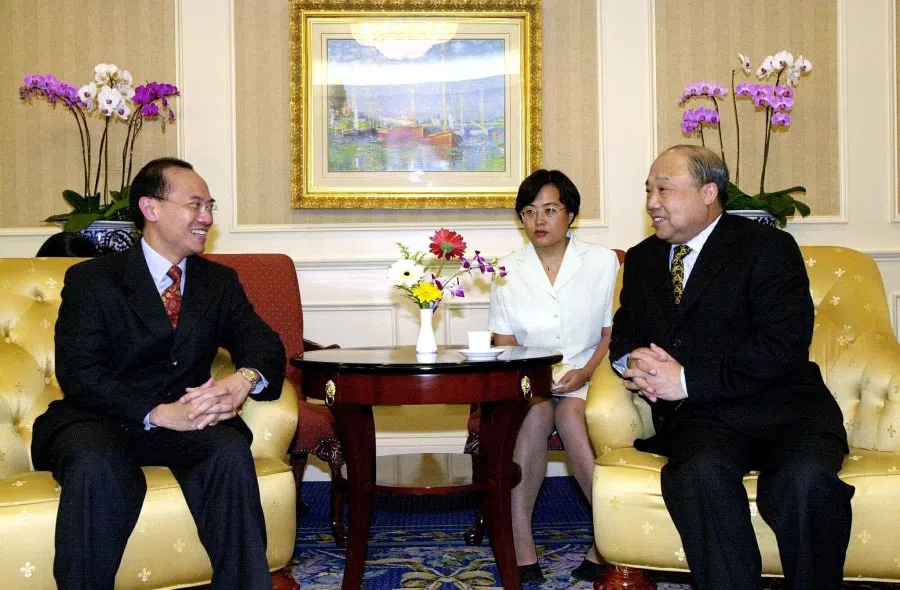
However, as an FTA with mainland China was much more valuable to Singapore than one with Taiwan, and since Taiwan was also not enthusiastic, I stopped making any more effort for an FTA with Taiwan. Interestingly, some years later, when cross-strait relations were much better, it was mainland China which signalled to Singapore that we should have an FTA with Taiwan. This was eventually concluded in 2013 as the Agreement between Singapore and the Separate Customs Territory of Taiwan, Penghu, Kinmen and Matsu on Economic Partnership or ASTEP. This was signed after mainland China itself had established an FTA with Taiwan.
The donor, Huang Chi Chuan (黄启川), was from Taiwan's coast guard and a member of the Foundation. He agreed immediately to donate his marrow.
2004: a difficult year
Before becoming PM, Lee Hsien Loong made an unofficial visit to Taiwan in July 2004. Despite both sides agreeing to keep the visit confidential, the Taiwan media went to town with the news, with banner headlines every day. This undermined Beijing's position and made its tacit understanding of Singapore's relationship with Taiwan untenable. Beijing objected strongly and Singapore's relations with the PRC nose-dived. This was the first item on my desk to handle when I became foreign minister in Lee Hsien Loong's Cabinet in August 2004.
A month earlier, my youngest son, had a second relapse of leukaemia. He needed a bone marrow transplant. Even with a bone marrow transplant, his chance of survival was less than 10%. He has three siblings. The chance of a bone marrow match for each is 50%. Unfortunately, none matched his bone marrow. We searched the bone marrow registry in Singapore. There was no match. We searched in Hong Kong. Again there was no match. Finally, through Tzu Chi Foundation, we found a match in Taiwan.
The donor, Huang Chi Chuan (黄启川), was from Taiwan's coast guard and a member of the Foundation. He agreed immediately to donate his marrow. A coke can of bone marrow was aspirated from each side of his hip bone with a big needle while he was under general anaesthesia. A week before, he was injected with a drug to stimulate bone marrow production. It was not a procedure without risk.
The Taipei representative in Singapore and Taiwan's foreign ministry facilitated the transfer of the marrow which was carried by his Singapore oncologist through Taipei airport to the US where my son was waiting for the marrow after his own marrow had been destroyed at St. Jude's Children Research Hospital in Memphis, making sure that the precious cargo was not x-rayed. I informed my old friend, then Taoyuan city mayor Eric Chu, who quickly sent gifts to Tzu Chi Foundation in gratitude on my behalf.
The PRC wanted to restore relations with Singapore but wanted us to make the first move. I asked to meet Foreign Minister Li Zhaoxing while we were both in New York City for the UN General Assembly. A date for a confidential meeting was set. I arrived in New York City, gave my speech at the UN and then flew to Memphis to see my son and my family. My wife had brought all our four children and her mother to Memphis leaving me alone in our Singapore house. My heart was heavy. Friends who saw me told me later that I looked dreadful. At the UN, I had made a speech affirming Singapore's "one China" policy. I decided to say it this time because of my forthcoming meeting with Minister Li.
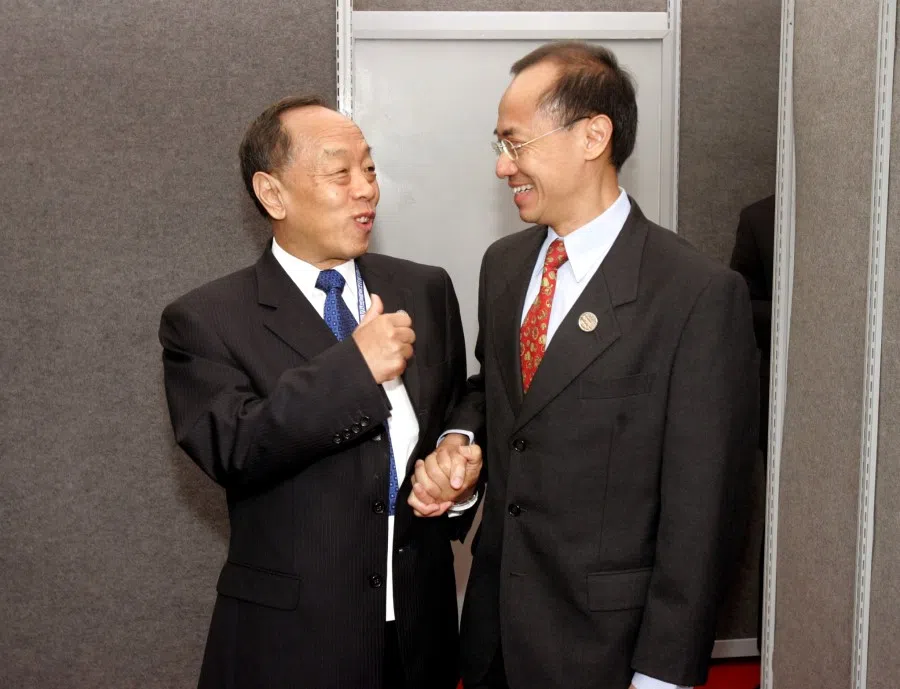
Taiwan's diplomats doing their lobbying in New York were angry and called me names. When asked by the media, I expressed sadness and said that we treasured our relations with the Taiwanese people. I did not tell the media then that it was Taiwan which was helping to save my son at that time. After Memphis, I flew back to New York to meet Minister Li. He wanted Singapore to respect mainland China's core interest on Taiwan which I emphasised we did. In fact, I had made this clear at the UN. In return, however, I asked mainland China to respect our core interest on Taiwan also. Gradually, bilateral relations were restored the following year without Singapore changing its position on Taiwan.
The doctor who admitted my son for treatment at St. Jude's is Ching-hon Pui (裴正康). He hails from the Pei family which supplied many famous officials and generals during the Tang dynasty. Dr Pui was born in Hong Kong and did his medical degree at National Taiwan University before going to the US and becoming the number one expert in the world on the treatment of childhood leukaemia. He told me that he is always grateful to Taiwan for his medical education. In Memphis, where my family stayed for nine months, Dr Pui got the Taiwanese Christian community there to help look after them.
It took a year before my son recovered completely. During that time, the doctors, without informing us, asked Mr Huang, the donor, if he could supply more marrow if needed. Without hesitation, he said, yes, and blood too if that could help.
When I lost my seat in the General Elections of May 2011, the first thought that went through my mind was that I would bring my wife and son to Taiwan.
Personal gratitude
As foreign minister from 2004-2011, I did not visit Taiwan then. Not being able to express gratitude to Tzu Chi in person weighed on me. When I lost my seat in the General Elections of May 2011, the first thought that went through my mind was that I would bring my wife and son to Taiwan.
In June, my wife and I brought our son to thank Ven Cheng Yen in Hualien. She is a saint. Tzu Chi's procedures did not allow the donor and recipient of bone marrow to know each other in order to protect them. We asked for special permission to meet the donor. She relented as seven years had passed and the donor was himself a member of Tzu Chi. The meeting was arranged in Taipei. As former Premier Su Tseng-chang had already invited me to a breakfast meeting, I could not join my wife and son when they met the donor. I only met him myself in 2015 when I launched my first book in Taipei.
In Taipei, we called on President Ma Ying-jeou, Vice-President Lien Chan and Premier Vincent Siew. To all of them, I proudly introduced my son as Taiwanese by blood. Indeed his blood type is O from the donor while I am AB and my wife is B.
Fred is now 29 years old. He graduated as a doctor from University College, London and has just completed two years as a junior doctor in England. The first thing we did when we arrived in Taipei last Sunday was to take a car to Hualien, to call on Ven Cheng Yen. She was happy to see Fred and put a duty on him to help others.
As an ethnic Chinese with blood connections to both the people of mainland China and Taiwan, the idea of an independent Taiwan is difficult to accept. However, I can understand why many Taiwanese would not want to be part of the PRC.
Status quo not sustainable
As an ethnic Chinese with blood connections to both the people of mainland China and Taiwan, the idea of an independent Taiwan is difficult to accept. However, I can understand why many Taiwanese would not want to be part of the PRC. The way of life in Taiwan is attractive. Aspects of Taiwanese society reflect its colonial experience under the Japanese just as Singapore still reflects much of what we inherited from the British.
In his book, Lee Teng-hui freely talked about his closeness to Japanese culture. To me, this is not much different from Lee Kuan Yew's closeness to British culture. Many Singaporeans enjoy visiting Taiwan. Taiwan has a different quality from mainland China and Hong Kong and it would be a pity if Taiwan were to lose its distinctiveness.
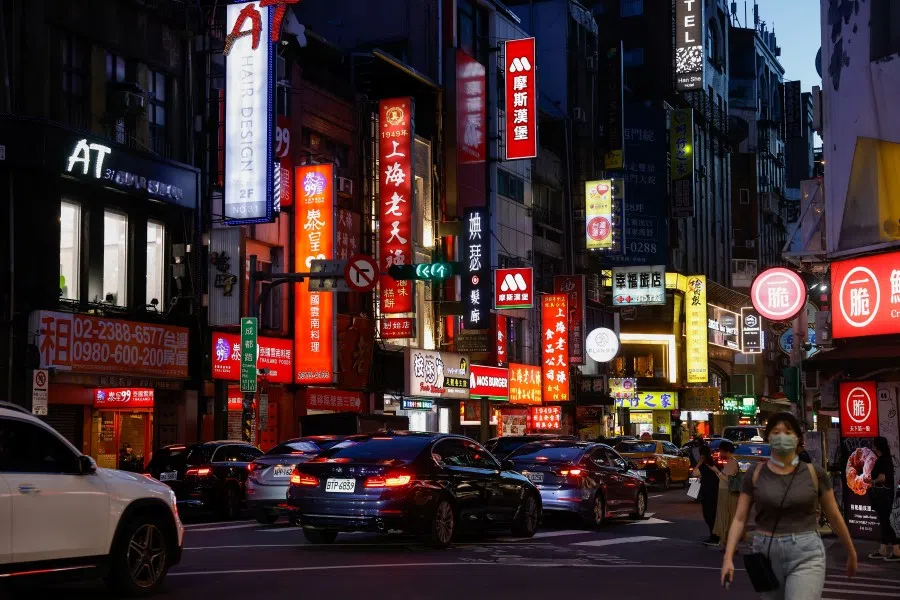
Knowing a little of the history of Taiwan, I can understand the emotion against the rule of the old KMT government under martial law. Many Taiwanese would not want that experience to be replaced by PRC rule. The first article of the political platform of the DPP states that its mission is: "Establishing the Republic of Taiwan as a sovereign, independent, and autonomous nation." This reflects the DPP's aspiration even though both DPP presidents, Chen Shui-bian and Tsai Ing-wen, swore on the Constitution of the Republic of China when they took office. This is probably the reason why the "one China" consensus has not been acceptable to them because of the hope that Taiwan can one day be an independent country.
The current situation is unstable and transient. Taiwan was taken from China by Japan after the War of 1894. In November 1943, Generalissimo Chiang Kai-shek met US President Franklin Roosevelt and UK Prime Minister Winston Churchill in Cairo. In the Cairo Declaration, Taiwan was to be returned to China. This was affirmed by the Potsdam Proclamation in July 1945 after the war in Europe ended but before Japan surrendered. When the CPC defeated the KMT in mainland China, Taiwan was able to remain separate only because of the intervention of the US. It is not surprising that on the South China Sea and the Diaoyu Islands, mainland China and Taiwan hold identical positions because the constitutional territorial claims of both the PRC and the ROC are to all of China, although they adopt different approaches to South China Sea disputes.
How long the US can do this depends on the relative military power of the US versus China and the willingness of the Taiwanese people to be played as a piece on the geopolitical chessboard of US-China relations.
The role of the US in keeping Taiwan separate is of course common knowledge but was not evident at all when I visited Kinmen with former Premier Vincent Siew in 2015. I think this was to save face for Taiwan. The hard reality is that Taiwan can only remain separate from mainland China with the support of the US.
In 1979, the US recognised Beijing as the sole legal representative of China. This meant that the de facto position of successive US administrations to keep Taiwan separate is in contravention of what the WWII victorious powers had agreed to in Cairo and Potsdam. How long the US can do this depends on the relative military power of the US versus China and the willingness of the Taiwanese people to be played as a piece on the geopolitical chessboard of US-China relations.
On that chessboard, Taiwan is a critical part of the first island chain to contain the PLA navy and air force. The leaders and people of Taiwan know that US policy on Taiwan is formulated not out of love for the Taiwanese people but because Taiwan is an important piece to be used against mainland China. It is also good business for US armament companies. When Trump was elected president, he explained that a reason for him to receive a congratulatory call from President Tsai Ing-wen was because Taiwan bought billions of dollars of US military equipment. Many Western politicians who profess their support of Taiwan hardly know the geography of Taiwan, let alone its history and culture. I think many if not most Taiwanese are aware that the only reason the US supports Taiwan is to deny it as an unsinkable aircraft carrier to mainland China and not because it is a democracy.

The leaders and people of Taiwan cannot influence the larger dynamics of superpower contest but they can decide how much they are willing to be played in that contest. The status quo may seem attractive but it is unsustainable because the relative strength of the PRC versus the US is shifting in the PRC's favour. By 2050, the PRC's economy will be significantly bigger than that of the US even allowing for a lot of uncertainty. If the PRC's per capita income reaches half that of the US, the PRC economy will be roughly equal to that of the US and EU combined.
The preponderant military strength of the US today is partly financed by the ability of the US to print more dollars to cover its debt, which, in effect, is a tax on the entire world. Once the US dollar loses this position, which seems ever more likely because of the manner in which the dollar is being weaponised, it will be much more difficult for the US to maintain its military superiority. The American people will then have to decide between guns and butter.
Lee Kuan Yew saw the trend as inevitable and constantly urged Taiwan leaders to negotiate earlier rather than later with mainland China. Taiwan is likely to achieve a better outcome for itself by negotiating earlier. In Taiwanese democratic politics, this is of course difficult because the political party proposing settlement will be accused of selling out. It is easier to say: keep the status quo, but the status quo is in fact unsustainable. 不独、不武、不统 (budu, buwu, butong, meaning "no unification, no independence, and no use of force") only postpones the problem.
The clock ticks against Taiwan
The choices are therefore stark. Broadly speaking, they are binary. Taiwan can hang on to the status quo in the hope that something will happen to mainland China one day which makes unification unnecessary. Or, Taiwan can work towards gradual convergence with mainland China into a future China which is not what the PRC is today.
Let me deal in greater detail with the first scenario which is maintaining the status quo until Taiwan has an opportunity to become independent. However strong militarily Taiwan may be, it cannot on its own fight mainland China even if the US supplies the most advanced military equipment (which it will never do for fear of losing critical military technology to mainland China).
The big question is whether the US will intervene with its own air force, navy, marine corps and army. If it does, the US will in fact be fighting a war against mainland China. In a war against mainland China, Taiwan is only a pawn and will be sacrificed if needed. The Ukraine war is instructive. The US does not want to fight Russian forces in Ukraine directly because that turns the Ukraine war into a war between NATO and Russia. As a result, the biggest price is being paid by Ukrainians, especially in human lives lost. Economic sanctions have hurt Russia to a certain extent but cannot defeat Russia so long as the PRC maintains economic links with Russia.
Using conventional forces, it is unlikely that the US can prevail over mainland China in a war over Taiwan. Mainland China now has the ability to hit and destroy US aircraft carriers with hypersonic missiles. Leaked US intelligence report stated that in February this year, China successfully tested a DF-27 intermediate-range ballistic missile carrying a hypersonic glide vehicle over thousands of kilometres. Thus, even Guam is vulnerable. In order to prevail, the US needs to threaten mainland China with the use of nuclear weapons. This threat is only credible if the US can deny mainland China a second-strike capability. Compared to the thousands of intercontinental ballistic missiles (ICBMs) the US possesses, mainland China has a few hundred. Land-based ICBMs are vulnerable to a first strike even if they are put on high-speed trains and tucked in tunnels.
All this means that in ten years or so, mainland China has an assured counter strike capability.
Mainland China's only reliable counter strike capability is its strategic submarines in the South China Sea. These submarines are being tracked and one reason for AUKUS is the ability to hunt them down with more attack submarines from Australia. Faced with this threat, mainland China's response is to increase rapidly the number of ICBMs in its arsenal, let us say, to two thousand.
Silo construction in Xinjiang suggests that there could be more silos than missiles to ensure that a first strike by the US cannot destroy all of mainland China's ICBMs. Even if the majority of mainland China's ICBMs are destroyed, there will be enough left to wipe out major US cities. In the meantime, like in the 1960s when the Soviet Union was a threat, China is reportedly building underground complexes again.
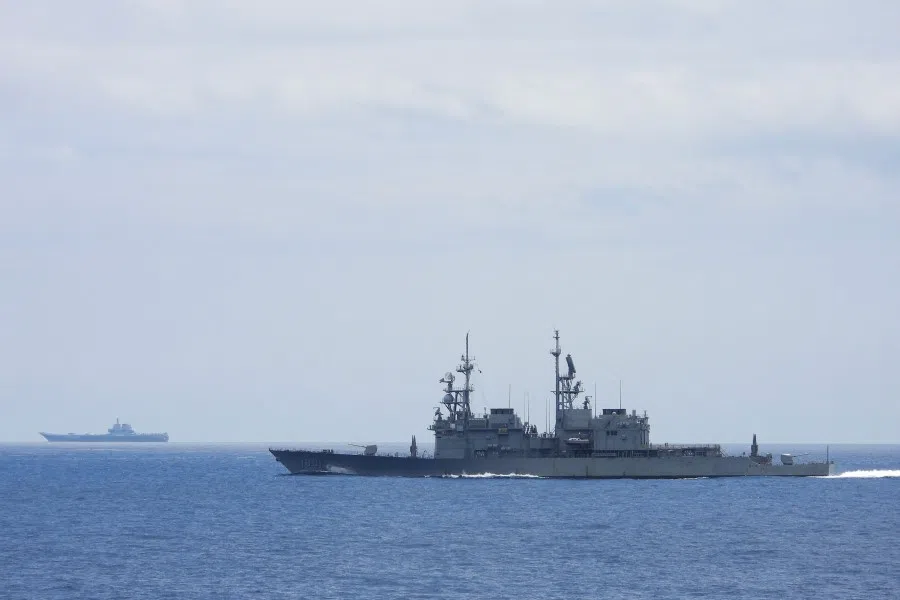
All this means that in ten years or so, mainland China has an assured counter strike capability. By then, the US can't prevail militarily with reasonable certainty in a war over Taiwan, and can't threaten China credibly with a nuclear strike. Of course, the US would not mind the Taiwanese fighting a limited war against mainland China provided it is not directly involved itself, like Ukraine today. I doubt the Taiwanese people want Taiwan to become another Ukraine.
What about economic warfare against mainland China in alliance with Europe and Japan? Compared to Russia, mainland China is less vulnerable to economic sanctions. Mainland China can also cause substantial economic damage to the US, Europe and Japan. Mainland China has many more economic cards than Russia has today. We can be sure that mainland China has analysed in detail the economic sanctions that the US has unleashed on Russia after it invaded Ukraine and would already be making defensive preparations.
In short, it is extremely high risk to base Taiwan's future on the hope that maintaining the status quo will eventually open a pathway for Taiwan to leave Egypt, using Lee Teng-hui's words, and become independent. Is there a possibility that mainland China will accept the status quo indefinitely without taking military action? This is unrealistic. Once mainland China has come to the conclusion that the US cannot prevent unification, it will increase political, economic and military pressure on Taiwan.
In short, it is most unwise to plan Taiwan's future on the basis that the US will prevent unification by force. My belief is that the clock ticks against Taiwan.
Merger of equals?
The second scenario suggests a merger of equals after a lengthy transition period. If mainland China knows that the end point is unification after a period of time, then maintaining some kind of a status quo for many years will be acceptable to it. This is only provided both sides sincerely work towards gradual convergence in the meantime, including preparing their people psychologically for it. Both sides need to make concessions. To be sure, society on both sides is changing. Certainly the PRC today is not what the PRC was 20 years ago and the PRC in 20 years' time will be very different from what it is today.
In 2015, President Xi Jinping made a major move in meeting President Ma Ying-jeou as an equal in Singapore. Xi was relatively new in his office as he had only become general secretary in October 2012 and president in March 2013. He had just fought a life-and-death struggle within the PRC itself to consolidate his position. Yet he made this political move which was not without personal risk to himself. At the meeting, Xi and Ma addressed each other as "Mister" (先生) which transcended political titles. The words exchanged over dinner at the Shangri-La were moving.
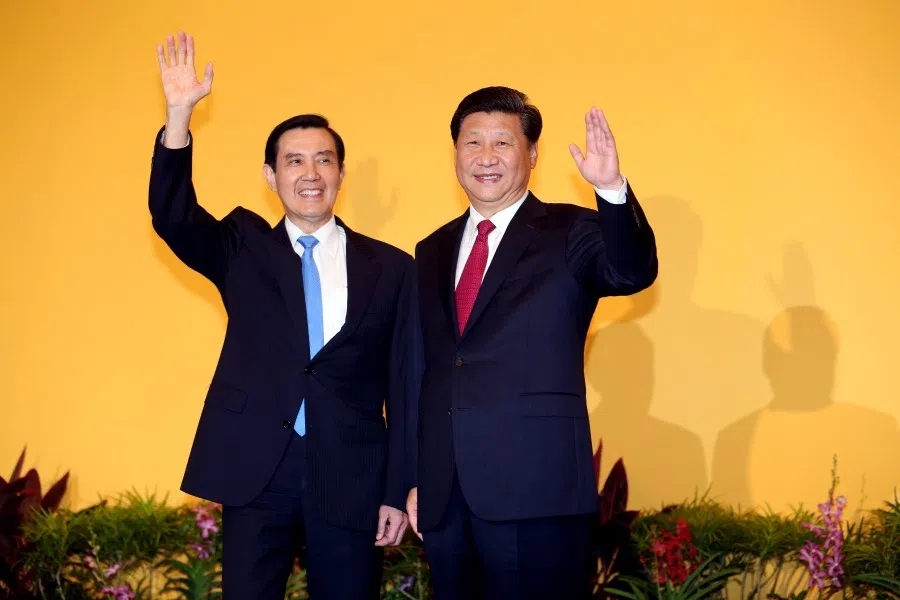
Xi in his opening remarks said: "No matter how much difficulty we have gone through, no power can separate us because we are closely-knit kinsmen, and blood is thicker than water. Now we are at a juncture in our relationship. We cannot repeat historical tragedy. We cannot lose the fruits of our development. People across the strait should continue to push forward a peaceful development and enjoy the fruits of peace together. We should learn and reflect on the history of the cross-strait relationship. We must be responsible for history, and make wise decisions that will stand the test of time. We must act together and show the world that the Chinese people across the strait have every ability to handle our own issues, and to contribute to the peace and stability in the region, and the world."
In his opening remarks, Ma Ying-jeou said: "At this moment, Mr Xi and I are sitting across from each other, gathered together in one room. Behind us is the historical backdrop of six decades of separate governance on the two sides of the Taiwan Strait. Before us lie the accomplishments that the two sides have achieved in the past few years through our commitment to replacing antagonism with dialogue and confrontation with rapprochement. We hold in our hands the future objective of sustainable peace and prosperity. At this time, the two sides of the Taiwan Strait are proclaiming loudly and clearly to the rest of the world our determination to consolidate peace in the Taiwan Strait and the message that we will promote peace in the region."
Ma ended with a quotation from Northern Song dynasty scholar Zhang Heng-qu (张衡渠, 1020-1077): "Devote your heart to heaven and earth, devote your life to the people, uphold the wisdom of past sages, create peace for generations to come." Ma called on the people on both sides of the Taiwan Strait to "work together, devote our lives to our people, create peace for generations to come, and open a new chapter of peace and a glorious future".
I was in the Kuok Group at that time and asked who footed the bill for the dinner. I was told it was split exactly 50/50. Ma brought Kinmen Kaoliang, Xi brought Guizhou Maotai - both of equal strength.
Xi's gesture was really intended for President Tsai Ing-wen because Ma was already stepping down. I called on Tsai in Taipei after she was elected but before she was sworn into office. She told me that the PRC was not being helpful. But when I remarked that Xi had just opened a road for her in Singapore, she did not respond. I believe that the reason was because the use of that road required her to accept the "one China" consensus which was unacceptable to her and many members of the DPP.
No consensus on the 'one China' consensus
When the "one China" consensus was arrived at in 1992, each side was free to interpret what "one China" meant. Mainland China did not require Taiwan to accept China as the PRC. However, there is suspicion that the "one China" consensus is only a bait to draw Taiwan into a PRC trap. It is largely distrust which prevents acceptance of the "one China" consensus and not the words.
We need a creative breakthrough to give hope to young Taiwanese. When I was chairman of Kerry Logistics, I made a number of visits to KerryTJ in Taiwan and met our Taiwan colleagues. One morning, I visited the drivers at a depot and saw how they paraded military-style after doing exercises. To my surprise, the team leader turned around and reported to me which I hastily responded to with a salute, remembering my old days in the army. I was told that this morning parade was a vestige from the period of Japanese colonisation.
I cannot interfere in a family quarrel. But, as a relative, I hope you will allow me to share a thought.
While we had many able young men and women working for us in KerryTJ, I knew the wages they received were significantly lower than those in Hong Kong and Singapore. Without a clearer long-term future for Taiwan, it is difficult for the Taiwan government and Taiwan businessmen to think and plan far ahead. In all societies, the most important thing is for people to have hope for the future. With hope, they can bear all kinds of uncertainty and hardship. This is what Taiwan badly needs. But it must be realistic hope, not false hope.
If hope is built on an illusion like the possibility of Taiwan independence, it will lead to tragedy. Emotionally, I found it distasteful when an American politician said that the US would bomb and destroy TSMC if China invaded Taiwan although, intellectually, I understood the logic of his remark.
I cannot interfere in a family quarrel. But, as a relative, I hope you will allow me to share a thought. Let us say that Taiwan's interpretation of "one China" is that of a Chinese Commonwealth. Variations of the Chinese Commonwealth idea have been proposed before including by Annette Lu. Mainland China should not object. Taiwan has a right to its own interpretation of "one China".
During the Zhou dynasty, the kingdoms of the Spring and Autumn Period and the Warring States were in fact quite autonomous. In the Zhou capital of Luoyang, there were nine ding (jiu ding 九鼎). When Qin united China by force, the nine ding disappeared and were never found again despite extensive searches by the Qin emperor. I like to think of Taiwan as a separate, precious ding which completes the other eight. It will be sad and disastrous if anti-PRC Taiwanese decide to destroy their own ding.
Perhaps the Chinese Commonwealth can see mainland China and Taiwan meeting regularly to make rules governing their interaction and resolving disputes without there being an overall executive body for an extended period of time.

Iceland has arguably the oldest democracy in Europe. For many years, the Icelandic parliament, called the Althingi, had no executive body. The tribes of Iceland met every year in the Rift Valley to make common rules and settle disputes. After each meeting, they dispersed to their separate corners of the island but still interacted with one another in different ways. Invariably, there would be disagreements and conflicts the resolution of which would have to wait till the next Althingi was convened. Switzerland had a similar beginning in the Old Swiss Confederacy. Till today, the governance of Switzerland is much decentralised to the cantons.
Perhaps the Chinese Commonwealth can see mainland China and Taiwan meeting regularly to make rules governing their interaction and resolving disputes without there being an overall executive body for an extended period of time. How much executive integration is introduced step by step, and in which functional domains, would depend on the practical issues to be resolved and the degree of trust that exists between both sides.
Both sides will need to modify what they teach to a younger generation in anticipation of greater convergence on the basis of peace, mutual respect and a common history. How long it will take for the Chinese Commonwealth to evolve into "one China", and what the nature of that "one China" will be, no one can foresee today. By then, it is entirely possible that there will neither be a PRC nor an ROC but, just simply, China.
Permit me to venture further and share another idea which is for the major political parties in Taiwan to consider somehow incorporating the idea of a Chinese Commonwealth in their own party constitutions. Changing words already inscribed in existing party constitutions may be too difficult. But it may be possible to add a preamble as a way to update these constitutions to current conditions and future hopes. A more united Taiwan is better able to negotiate with mainland China than a divided Taiwan.
When Taiwanese people vote for their local or central governments, their principal concern is with livelihood and not abstract arguments about what the "one China" consensus means. Broad agreement among Taiwan political parties about what "one China" consensus means will strengthen Taiwan's negotiating position vis-a-vis mainland China and benefit the welfare of ordinary Taiwanese. I remember my old friend, Eric Chu, remarking in the US last year that the 1992 Consensus is a "created ambiguity" between both sides and is a "no consensus" consensus. Eric was criticised for saying this but what he said reflected the reality.
Speaking as a Singaporean, I wish no better outcome than a gradual process which leads towards eventual peaceful reunification because the alternative is inevitable war which will be tragic...

During the dinner he and his wife hosted me, my wife and my son last night, he said that he only repeated what Koo Chen-fu said a long time ago. This ambiguity reminded me of the second verse of the Tao Te Ching, which says that the name which can be named cannot be the eternal name (ming ke ming fei chang ming 名可名非常名). The "one China" consensus cannot be overly precise because it is ambiguity which holds the key to the future. That future then becomes one of hope.
Speaking as a Singaporean, I wish no better outcome than a gradual process which leads towards eventual peaceful reunification because the alternative is inevitable war which will be tragic, not only for Taiwan and mainland China but also for Singapore and indeed the entire world. My wife and I owe much to Taiwan and our ardent wish is for the Taiwanese people to enjoy peace and prosperity for generations to come.
Related: Former Singapore FM George Yeo on CCP's centenary: The Chinese revolution continues | George Yeo: Charm and China in a multipolar world | Chinese legal expert: 'Legal reunification' with Taiwan the best solution | Is there still hope for peaceful reunification in the Taiwan Strait? | How is mainland China planning to achieve reunification with Taiwan, when a common history no longer holds the same significance?



![[Big read] When the Arctic opens, what happens to Singapore?](https://cassette.sphdigital.com.sg/image/thinkchina/da65edebca34645c711c55e83e9877109b3c53847ebb1305573974651df1d13a)

